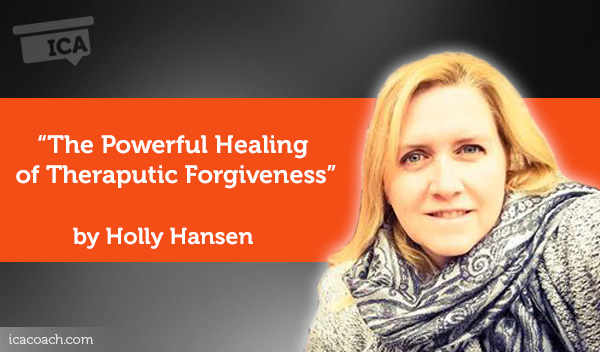
Research Paper By Holly Hansen
(Empowerment and Transformation Coach, UNITED STATES)
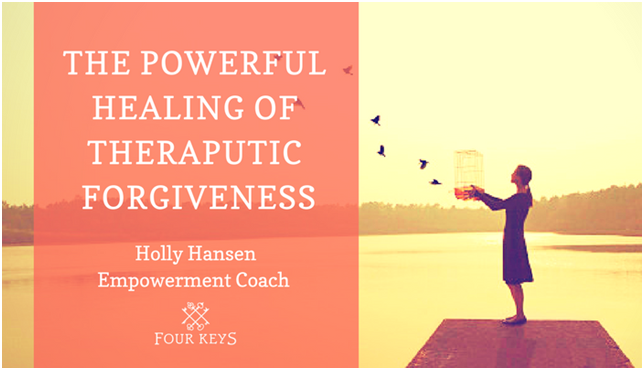
In this Research Paper we will explore the idea of Forgiveness:
To set the tone for this paper, and create a common understanding of what Forgiveness means, let’s begin by looking at several online dictionaries definitions of this word. Once we have done this we can go into depth about the impact of Forgiveness in our lives.

for·give
fərˈɡiv/
verb
Stop feeling angry or resentful toward (someone) for an offense, flaw, or mistake.
“I don’t think I’ll ever forgive David for the way he treated her”
“They are not going to pat my head and say all is forgiven
Synonyms: pardon, excuse, exonerate, absolve;
Cancel (a debt).
“He proposed that their debts should be forgiven”
Used in polite expressions as a request to excuse or regard indulgently one’s foibles, ignorance, or impoliteness.
“you will have to forgive my suspicious mind”
synonyms: excuse, overlook, disregard, ignore, pass over, make allowances for, allow;
antonyms: punish
Psychological Definition of Forgiveness: Forgiveness is a cognitive and emotional process that eradicates chronic hostility, rumination, and their adverse effects (Worthington et al., 2007).
As we can see by the definitions, before forgiveness is even needed, first an offense has to happen to us or be witnessed by us in some format.
Once the offense is internalized and put into our mind, we do something called Cognitive Evaluation (appraisal). Effectively what this means is we appraise and evaluate our response and reaction to the offense. Then the outcome of our evaluation defines the degree of emotional intensity and reaction, as well as the meaning we associate with it.
As part of the research for this paper, I found an interesting research study called: “How the brain heals emotional wounds: the functional neuroanatomy of forgiveness”. Here is an example they used within the research study of cognitive evaluation that resulted in forgiveness, instead of unforgiveness, based on our appraisal of the situation
… while generally we feel hatred as victims of a robbery, we may become merciful if we learn that the thief needed unaffordable medical care for his child.
However, when someone does a cognitive evaluation of an offense and decides it is unforgiveable, this is where the offense can become what Dr. Maxwell Maltz, author of Psycho-Cybernetics calls Emotional Scars.
These emotional scars, are effectively caused by allowing the offensive experience to remain unforgiven. And according to Dr. Maltz, one of the most impactful ways to heal Emotional Scars is through the act of Therapeutic Forgiveness: The conscious act of granting forgiveness in order to heal emotional scars.
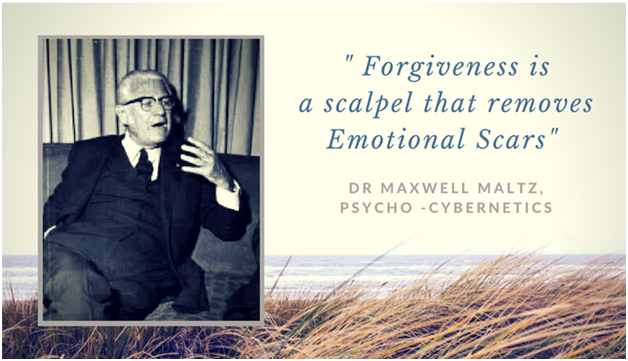 Dr. Maltz, in addition to being the author of Psycho Cybernetics, was a plastic surgeon who experienced over and over seeing patients who were not physically scarred or damaged, but were in fact emotionally scarred. These emotional wounds caused distorted unhealthy self-perceptions within his patients. Most of these emotional scars were originated from feeling unforgiveness for others, or even toward themselves for some perceived offense experienced.
Dr. Maltz, in addition to being the author of Psycho Cybernetics, was a plastic surgeon who experienced over and over seeing patients who were not physically scarred or damaged, but were in fact emotionally scarred. These emotional wounds caused distorted unhealthy self-perceptions within his patients. Most of these emotional scars were originated from feeling unforgiveness for others, or even toward themselves for some perceived offense experienced.
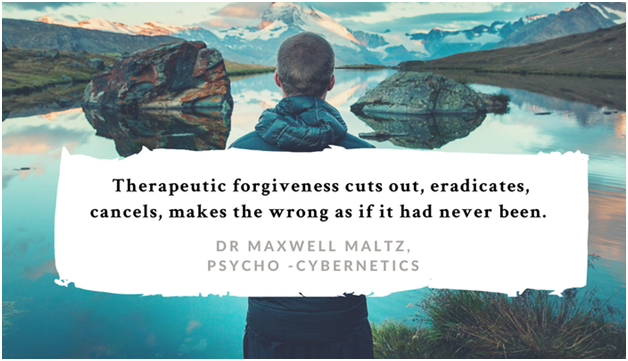 One Psychological Research Study on the impact of Forgiveness on the Brain
One Psychological Research Study on the impact of Forgiveness on the Brain
In the research study entitled “How the brain heals emotional wounds: the functional neuroanatomy of forgiveness” they decided to study the impact of forgiveness on the mind, by examining brains using functional Magnetic Resonance Imaging (fMRI).
Healthy participants were induced to imagine social scenarios that described emotionally hurtful events followed by the indication to either forgive the imagined offenders, or harbor a grudge toward them. Subjects rated their imaginative skills, levels of anger, frustration, and/or relief when imagining negative events as well as following forgiveness.
It was already apparent before the study began that forgiveness was associated with positive emotional states as compared to when people were in a negative emotional state of unforgiveness; So this study in particular was focused on what areas in the brain occurred during the process of someone choosing whether or not to granting forgiveness.
From Study – Figure 3. Granger Causality maps for forgiveness and unforgiveness.
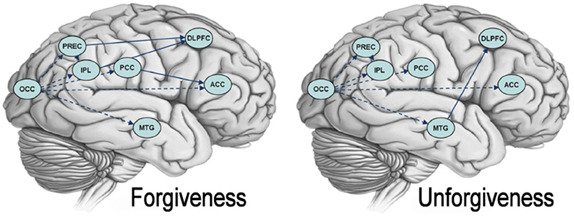 The MRI scans showed that granting Forgiveness vs Unforgiveness was associated with activation of specific brain areas. The results offered some very interesting insights:
The MRI scans showed that granting Forgiveness vs Unforgiveness was associated with activation of specific brain areas. The results offered some very interesting insights:
The ability to reappraise negative events in positive terms, such as by re-interpreting the motivations of the offender in a benevolent manner (McCullough, 2001) is a key step in the process to forgive a wrongdoer. Thinking of a negative event as being not too bad (Shapiro, 1991), or that the wrongdoers were not directly responsible for their act (Fincham, 2000), that they did not intend to harm (Frijda, 1986; Shapiro, 1991), or that they were instead motivated by altruistic reasons (Lindskold and Walters, 1983), reduces feelings of injustice, punitiveness, and unforgiveness in response to interpersonal transgressions. Thus, operating a benevolent/positive evaluation of the meaning of emotionally charged situations modifies the significance of these events, paving the way for forgiveness to take place. Neural activation in the DLPFC during forgiveness is consistent with our hypotheses and with the present findings.
Findings from “How the brain heals emotional wounds: the functional neuroanatomy of forgiveness
Effectively, when people in the study engaged in re-interpreting the motivations of the offender in a benevolent manner (whether the offender was another person, or themselves) when instead of looking at the situation for wrongness and justification of non-forgiveness – the study subjects were asked to look with empathy and altruistic reasons the objective/offensive situation occurred – and it paved the way for them to allow forgiveness to take place. So even someone who is currently in a state of unforgiveness, it is still possible they can still choose to re-evaluate the situation to look at it with empathy or altruism to identify if they can move from a state of unforgiveness into forgiveness.
The High Level Process of Forgiveness
Based on all of the readings and research I compiled – I was inspired to create a Forgiveness Flow Diagram to show at a high level the split forgiveness/ non-forgiveness paths that can occur from the point of a Hurtful Condition.
Three insights worth noting:
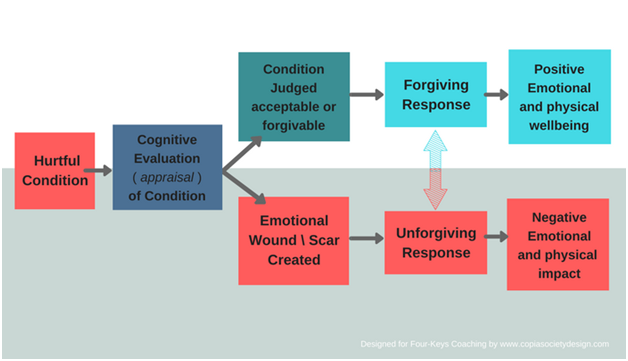
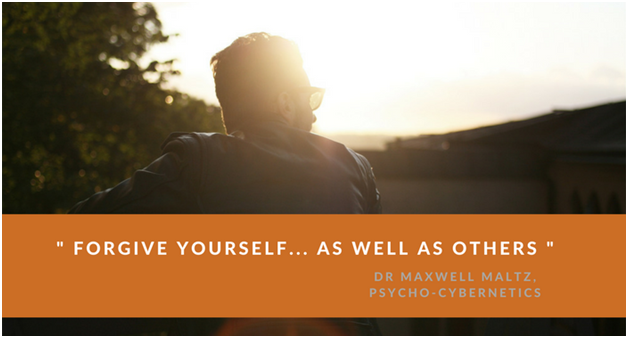 So as we can clearly see, in order to prevent or heal emotional scars/wounds, forgiveness of the source of your objection/ negative condition needs to occur.
So as we can clearly see, in order to prevent or heal emotional scars/wounds, forgiveness of the source of your objection/ negative condition needs to occur.
However, in order to fully forgive someone else, you also may also need to forgive yourself. This may seem strange at first, but let’s take a look at a few examples of how you might find yourself needing to consciously forgive yourself.
Examples of opportunities for self forgiveness
And there is a very interesting tie into Self-Compassion and Forgiveness worth considering – and how it impacts our ability to forgive ourselves and others.
According to Kristen Neff’s research, we are more likely to forgive our self and others, when we practice self-compassion. This is because part of a practice of Self-Compassion is being kind to yourself – but it is also about forgiving yourself, whether it is for a mistake you have made, or for a part you played in a problem.
… Self-compassion was significantly associated with forgiveness of others. Forgiving others requires understanding the vast web of causes and conditions that lead people to act as they do. It recognizes that try as they may, people sometimes do wrong (Worthington et al., 2005). In the same way, self-compassion recognizes that for an intricate and interconnected set of reasons, we often fail and make the wrong decisions (Neff, 2003b). The ability to forgive and accept one’s flawed humanity, therefore, appears to be linked to the ability to forgive and accept others’ transgressions. Neff/Pommier 2012 Study
According the research study I referred to earlier, psychotherapeutic interventions have facilitated forgiveness to help patients to manage anger, remove negative emotional effects of emotional wounds or scars.
Conversely, forgiveness promotes wellbeing (see Worthington et al., 2007 for a review), cardiovascular health (Lawler et al., 2005), and may increase survival rates (Chida and Steptoe, 2008). Specifically, trait forgiveness (i.e., a constant attitude to forgive) is associated with a diminished recourse to medications and alcohol, and state forgiveness (i.e., a situation-contingent forgiveness) with reduced heart rate and physical symptoms (Lawler-Row et al., 2008). This literature converges suggesting that forgiveness represents a positive, “healthy” strategy for the individual to overcome a situation that otherwise would be a major source of stress from a psychological and neurobiological point of view.
And many articles online pointed to a wide range of benefits associated with Forgiveness – which I have compiled in this graphic
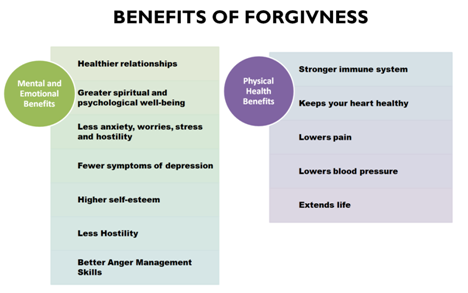
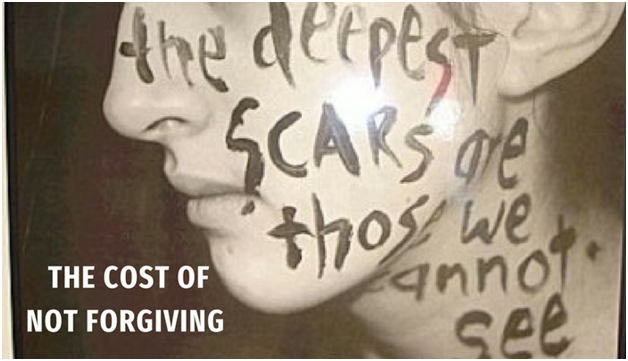 Having spoken about the benefits of forgiveness, it’s critical to consider the other side of the coin – the cost of Unforgiveness. When someone is unable or chooses to not forgive someone, as we saw in the earlier diagram on The High Level Process of Forgiveness section of this research paper, there are potential negative impacts to mental, emotional and physical state of that individual.
Having spoken about the benefits of forgiveness, it’s critical to consider the other side of the coin – the cost of Unforgiveness. When someone is unable or chooses to not forgive someone, as we saw in the earlier diagram on The High Level Process of Forgiveness section of this research paper, there are potential negative impacts to mental, emotional and physical state of that individual.
This is also called out in the research study we referenced earlier in this paper:
Negative affect and chronic emotional distress erode health (Hu and Gruber, 2008), alter cardiovascular reactivity (Holt-Lunstad et al., 2008), impoverish sleep quality (Stoia-Caraballo et al., 2008), stimulate the production of stress-related hormones, such as cortisol (Berry and Worthington, 2001), being associated over time with the development of clinical conditions such as depression (e.g., Nolen-Hoeksema and Morrow, 1991).
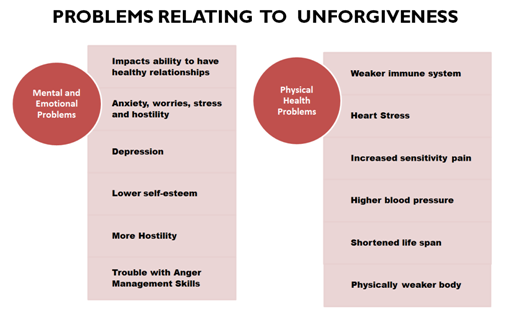
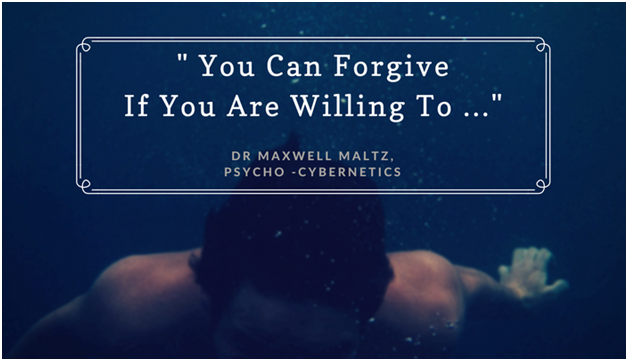 In this Research Paper we have covered a lot of ground on Forgiveness, which I hope will help you support your client, when part of their coaching journey includes the need to Forgive, whether it is someone else in their life, or if the person they need to forgive is themselves.
In this Research Paper we have covered a lot of ground on Forgiveness, which I hope will help you support your client, when part of their coaching journey includes the need to Forgive, whether it is someone else in their life, or if the person they need to forgive is themselves.
There are many wonderful coaching tools you can use to help your client through the process of forgiveness, and there is one in particular I would like to bring to your attention – it is an exercise I have personally used (and benefited from ) to help me with Forgiveness in my own life.
Therapeutic Forgiveness Mental Training Exercises From Psycho-Cybernetics
For the following two “therapeutic forgiveness” exercises, Dr. Maxwell Maltz suggests using the “Theater of the Mind”, or “Imagination Factory” – also known more commonly as Visualization. He recommends investing 30 minutes a day for 21 consecutive days on “quiet reflection”, working on this within your-self in solitude.
Therapeutic Forgiveness of Others
Choose one or two persons for whom you’ve long carried resentment over past slights and find a way in your heart to truly, completely forgive them, no strings attached, and ultimately do so via your actions toward them. Visualize a conversation with them.
Therapeutic Forgiveness of Yourself
Identify some past error or situation you have been carrying a grudge against yourself for, and forgive yourself, and finally, once and for all, banish this from your thoughts. Visualize a conversation with yourself.
Other coaching tools can also be used in lieu of solo visualization including, journaling, letter writing, or you could even lead your client through the visualization if they would prefer not to do it on their own.
In summary:
Research clearly shows that the mental, emotional and physical benefits of Forgiving far outweigh the negative outcome of choosing to not forgive in almost every situation we encounter in this life. There are so many positive role models for Forgiveness to guide us in our daily lives – Ghandi, Nelson Mandela, Buddha, Jesus, The Dali Lama, General Douglas MacArthur and more.
I sincerely hope this research paper has provided you a deeper insight into the impact of Forgiveness in our lives and the lives of our clients. In sitting down to write this research paper, my heart’s intent was to provide knowledge and insights to help you build a well-rounded understanding of Forgiveness, so you may help your clients in a profound and empowering way.
I will leave you with a quote from Nelson Mandela that beautifully summarizes why Forgiveness is so very important in each of our lives.
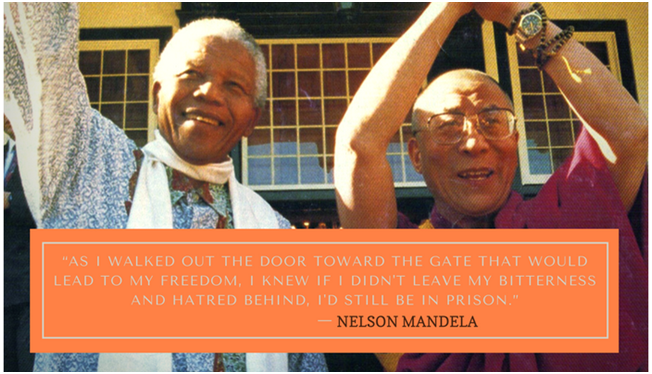
Research Paper Resources
Web Articles:
How the brain heals emotional wounds: the functional neuroanatomy of forgiveness
http://journal.frontiersin.org/article/10.3389/fnhum.2013.00839/full
5 Health Benefits of Forgiveness:
Forgiveness: Letting go of grudges and bitterness
http://www.mayoclinic.org/healthy-lifestyle/adult-health/in-depth/forgiveness/art-20047692
Book:
“The New Psycho-Cybernetics”, By Dr. Maxwell Maltz M.D., F.I.C.S., edited and updated by Dan S. Kennedy and Psycho-Cybernetics Foundation, Inc, Prentis Hall Press, Copyright 2001
Research Article:
Kristin D. Neff & Elizabeth Pommier (2012): The Relationship between Selfcompassion and Other-focused Concern among College Undergraduates, Community Adults, and Practicing Meditators, Self and Identity, DOI:10.1080/15298868.2011.649546 – http://dx.doi.org/10.1080/15298868.2011.649546
Graphics
created by Holly Hansen – using Canva.com
Other sources:
http://www.huffingtonpost.com/project-compassion-stanford/holding-grudges-effect_b_3142224.html
Copyright – All rights on original content reserved for this article – reprint allowed with permission received from Holly Hansen